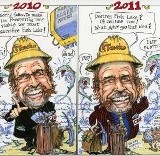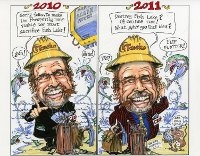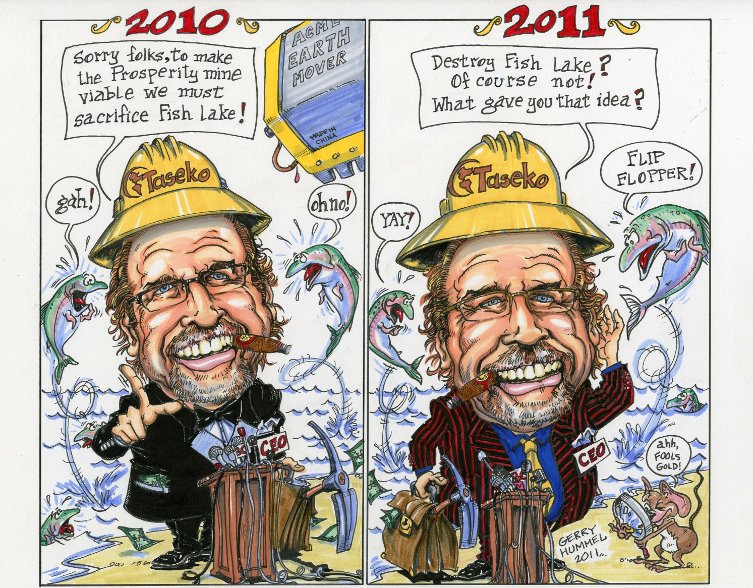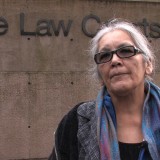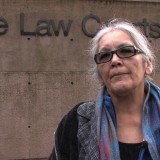From the National Post – March 3, 2011
by Hollie Shaw
Campaigning for a less-than-popular cause has always been a challenge — many times a welcome one — for advertisers.
They
can choose to ignore the negative rap completely (Cigarettes may kill
you … But look at these pictures of happy, slim models!) or divert
attention from what primarily bothers people about the product or
practice in question (Animals were slaughtered to make these garments
…But fur is biodegradable, and supports Canadian jobs!)
A new
campaign from DDB Canada’s Vancouver office is attempting to highlight
one of the more contentious topics in British Columbia, the farming of
Atlantic Salmon in the western-most province, a practice long decried by
environmentalists.
After years of silence on the issue, the B.C.
Salmon Farmers Association (BCSFA) says the entire industry — the
province’s largest agricultural export, with sales of $450-million
annually — needs to dispel a longstanding counter-campaign that it says
is frequently rife with myth and misinformation.
The opposing side
has had a significant head start, such as the decade-long “Farmed and
Dangerous,” campaign, a program from the Coastal Alliance for
Aquaculture Reform, a coalition of environmental groups in B.C. The
industry is 30 years old, so why is it speaking up now?
“The
companies were very focused on the fish and really didn’t pay a lot of
attention to questions that were being asked my members of the community
and some of the environmental groups here who have a focus on marine
conversation,” says Mary Ellen Walling, the BCSFA’s executive director.
“When they kind of lifted their heads up, there was quite a lot of
information out there that was dated, about practices that were in place
in the early days of the industry [but] that were not sustainable, and
rumours including that farmed fish got their colour form artificial
dyes.”
Setting aside the obvious conundrum of where the truth
lies, from a marketing perspective such campaigns can be very difficult
to mount.
“It is hard, quite challenging,” said Ms. Walling. The
campaign also comes in spite of rising sales. Half the supply of salmon
around the world is now farmed, and that number is expected to increase
with emerging markets developing such as China, whose growing middle
class is keen to consume more fish. The campaign aims to dispel the deep
stigma that exists, particularly in British Columbia, about the farmed
fish.
“Restaurants are concerned about offering farmed salmon on
the menu for fear that they will be picketed,” Ms. Walling said. “It’s
important to get the support of the general public.”
The public is
being targeted first through TV ads that show gullible people believing
everything they are told. One execution shows co-workers easily falling
for an obvious Internet fraud, while another shows a teen whose parents
discover the gory aftermath of a giant house party and throw their cat
out of the house when their son blames the mess on the hapless animal.
The tag line is “Imagine if we believed everything we heard.”
The
ads direct people to a website, www.bcsalmonfacts.ca, which lists a
number of common and lesser known industry “myths” and counters them
with “facts.” It also has an open forum for discussion from both sides
that is hosting an ongoing and lively debate.
According to Lance
Saunders, executive vice-president and managing director at DDB Canada,
many of the popular misperceptions about farmed salmon were shared by
his co-workers at the agency, who found that their concerns were
dispelled after they took tours of fish farms around the province and
learned about industry practices.
“They came back really energized
and positive and thought salmon farmers had a really interesting story
to tell and that it deserved to be heard.”
He conceded it can present a creative challenge to face off against a sustained opposition that is often dramatic and emotional.
“People
are so passionate about the topic,” he said. “We had a more calming
strategy. It serves no purpose to fan the fires with having the same
type of aggressive response. We took the high ground, to some extent,
and I think that won people over — it was more about transparency, I
guess, than being about who was right or wrong.”
The social media
elements included three weeks of 24-hour a day website monitoring that
responded to all posts on the main site and the Facebook page and
reposted anything positive or negative about the campaign that had been
put up on external websites or blogs.
While it is still too early
to gauge the public’s reaction to the campaign, Mr. Saunders said, a
larger study in April will measure any change in public sentiment.
Anecdotally, he said, people are interested in finding out more
information about farmed salmon and are more keen to learn and talk
about the topic than they have been in the past.
Ms. Walling believes attitudes can change slowly with tenacious education rather than outright persuasion.
“[The
association] does farm tours on a water taxi and tours of processing
plants and we have done food shows in B.C. for the past six years. When
we started doing the shows, there were arguments from many people [who
were] coming to the booth. Now there are lineups of people to buy farmed
salmon at the booth. It’s changing, but [until now] the message has
only hit a segment of the population.”
Read original article



